

|
Back to |
| The Front Page |
| People |
|
A courtside chat with Australia's Liz Fleming |
||||||||||||||||||||
|
interview by Bob Alman photos courtesy of Liz Fleming and Johnny Mitchell Posted August 5, 2009
|
||||||||||||||||||||
|
||||||||||||||||||||
Liz Fleming and her husband Bruce are among the most successful and enduring "mixed doubles" partners in the world. They were the only married couple both competing in the 2009 World Championships in South Florida, where this interview took place beside Court 11. Her global perspective, anchored in noteworthy achievements both on the court and in the croquet organization of Queensland, challenges traditional attitudes about the relationship of men and women to their sport, to each other on the playing field, and to the sporting organizations that try to govern all those interactions.
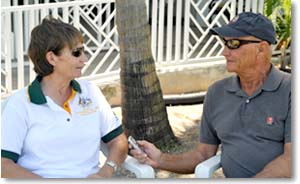
|
| Liz Fleming, one of three women competing in the 2009 World Championships, is interviewed courtside at the National Croquet Center in West Palm Beach by Bob Alman, editor of Croquet World Online. |
LIZ FLEMING: Well, yes, of course it's trouble. Having opinions is trouble.
BOB: I mean, you should be content to just play, shouldn't you?
LIZ: It's a question of responsibility, really, when you get involved with an organization. When I came from Manchester and we settled in Queensland in 1991, it was the croquet club that really helped me settle in. I met a lot of players, a lot of good players, and they were very, very kind and helpful, and so croquet was the vehicle, really, that helped me settle in this new country.
BOB: You are aware, aren't you, that some of your opinions seem too pointed, maybe a little hysterical. Like, "There she goes again!" Now, as a psychologist you must have a point of view on how you can be responsible for this sort of automatic response that people have, and including that in the way you manage yourself.

LIZ: Of course I'm not a fool, and I'm aware that when I've vented my spleen about something that I've vented my spleen...
BOB: There's a certain pleasure in that, of course...
LIZ: Of course there is, for me, for anyone. I don't believe, however, I have heard anyone refer to me as "hysterical" and for me, I don't feel any responsibility to be "nice" just for the sake of being nice or because I'm a psychologist and it's expected of me.
BOB: But Liz, you must realize that not only have you delivered an opinion, you're likely to be talking with people who don't have nearly the background or education or knowledge to meet you on equal ground, so you're likely to have an opinion that is actually more valid than theirs. And here's what I've noticed about volunteer, amateur organizations: that the people in them feel entitled to give tremendous weight to uninformed opinions simply because they are volunteers...
LIZ: Shall I respond as a croquet player or a psychologist? (both laughing) I just think people are intimidated sometimes when I don't quiver and shrink and go into a shell in response to criticism, and I don't do that. I've faced some pretty tough battles in life, and professionally I've faced some pretty tough characters too.
BOB: What about on the court? Do you get rattled there? Can you be intimidated, and maybe put off your game?
LIZ: Yes, of course I have, it would be a lie to say that hasn't happened. But I do think I have more tools because of my background - and I'm actually a RETIRED psychologist. Croquet Australia likes to point that out....
BOB: Retired, but not "retiring..."
LIZ: No, certainly not! (both laughing)
BOB: So, whatever you know about sports psychology, did you learn it by studying that as a discipline, or did you just apply what you already knew as a psychologist in the course of playing the game?
LIZ: I have not made a deep study of sports psychology, but of course everything you know in one discipline crosses over to another, just as what you know about golf or tennis might also apply to croquet or Gateball. And of course my clinical training comes to bear in the conduct of my life, and that's as it should be.
BOB: So you haven't made any particular study of sports psychology...
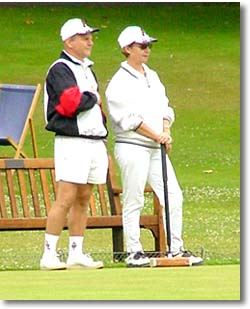
|
| Her frequent partnership with husband Bruce has been a major influence in sharpening Liz Fleming's competitive edge. She opposes "women only" events and is a strong advocate of "mixed doubles." |
BOB: But you must have formulated applications, techniques, in some way, and what an opportunity, having reached the highest level in the play of the sport!
LIZ: Well, four or five years ago, Bruce and I were the assistant coaches for Croquet Australia, and one of the suggestions made was that we bring whatever special knowledge and skills we had to the task. So, knowing that, I put together a series of lectures supported by assessments, visual aids (power points, charts, photographs, etc.) and reference handouts. These covered such things as Goal Setting, Mental Toughness Training and Periodization Training. Meanwhile Bruce focused on multiple peeling opportunities, risk assessment and ball movements. I have now held coaching sessions and seminars across most states of Australia, mainly focusing on squads and teams. I also continue to supply support to quite a number of individual players from all over the world. Mostly they're interested in mental toughness training skills, Periodization, IPS training [ideal performance state] - all necessary preparation phasing for peak performance.
BOB: It's a shame some of this isn't written down. Maybe we could make it easy for you, just do short takes in the magazine on limited subjects. We need more writing on this subject done by an expert player. About the state organizations, I actually have an opinion about how some of the croquet entities in Australia get to be perfectly awful in the way they conduct themselves, led by a few autocrats with their board peopled by yes-men and yes-women. I don't think Australians are intrinsically any better or worse than anybody else, but it may have to do with the way croquet is organized in Australia, with the state organizations having all the power and the money and the local or regional control. In my experience, some of the most workable croquet clubs in the US are run as benign dictatorships, which I think is kind of a natural form for local nonprofits, but when they get to be just a little bigger, comprising a number of clubs, when they get beyond that small nuclear family and central control therefore becomes more difficult, the dictatorship tends to become less benign and more oppressive.
LIZ: Each of the states is a separate entity, and they administer in their own fashion. They play the codes of the game they wish to play, they do it the way they want to do it...
BOB: Yes, and just to be clear, the way the United States Croquet Association is organized, everything comes from the top, traditionally, and the USCA organization is aware of that and wants to change that somewhat, to have more responsibility for the advancement of the sport show up locally and regionally. So here's my theory: volunteer nonprofits operate pretty much the same, everywhere, and a big variable is how much money they have and how many people are involved. When the organizations gets bigger, maybe the central authority has to come down harder, be more autocratic...
LIZ: Not necessarily, I think. In Queensland, the local clubs are pretty much autonomous, however, each club is assigned to a Region. These Regional Committees each have the opportunity of nominating a representative to the Croquet Association of Queensland Board of Management but within their region there is club competition, inter-club and regional events. They even have their own team events in Association, Golf Croquet and Gateball codes.
BOB: Did that happen because of the leadership in Queensland - for which you get pretty high marks from just about everyone, incidentally?
LIZ: It's a possibility. A number of years ago we, the CAQ [Croquet Association Queensland] were encouraged by state and local authorities to regionalize in a general push and guide toward improving governance of the minor sports. It was mostly carrot and stick, of course, brought about because of funding applications. We have a heavy reliance on grant funding, as many nonprofit sporting organizations do. It's been a steadily evolving process ever since and a hard road, but I'm determined to continue this improvement process. The 'Green Dragons' have left behind a few clones, which still need to be weeded out. There have been good and bad years, but hopefully we're currently running toward a purple patch up in Queensland at least and with a bit more luck and wind behind me I will not have to fall fatally on my own sword at the end of my term of office. There is a hard core of old guard fighting change all the way and not afraid to pull out all the stops to try to force their way back to power, of course, but hopefully sufficient light will have been shed that more and more good men and women will feel they're able to also stand up and be counted when it matters and carry on my push toward enlightenment and good, open and transparent governance.
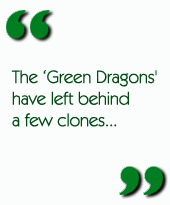
BOB: I can't help thinking of the state of Victoria now, because it seems obvious that just about all the pronouncements of the leadership about how and when they're going to break even with the Victoria Croquet Centre are not panning out, as predicted by myself and many others, merely on the basis of common sense and - in my case - lots of work experience in founding and developing facilities, including the National Croquet Center. And when I've gone back to them a couple of years down the road and said, "That didn't work, so now what?" there isn't any answer, or the answer is a non-answer, including the current favorite, which is, "Well, the question of break-even for the Victoria Centre isn't even a relevant question, because it's a state headquarters and financed by the state association, and all the clubs and the region benefit from it." Which is fine, but that's not what they were saying a couple of years ago or even a year ago. So what gives? And is this question even relevant to the other regions, because the Victoria Centre is so out-of-scale as a headquarters compared with the others...?
LIZ: That's it, really. It's completely out of scale and quite frankly comparing the VCA with the National Croquet Center here is ridiculous. The only similarity that I see is they both have twelve lawns. But I do not have any information regarding how financially sound any other state association is so can't comment on that or what, if any, benefit any other local clubs derive from the existence of such a large venue on their doorstep. In Queensland, for example, our "headquarters" is at a convenient and cost-effective location within Sports House, at Suncorp Stadium in Brisbane, which houses the administrative offices of a large number of minor sporting organizations but where there are no courts. These 'Sports Houses' are found at Brisbane's large sports stadiums such as Suncorp and the 'Gabba - which many readers I expect will have seen on TV during the cricket season. They're a great boost to our local sports bodies, supplying lots of advice and support to all our administrations; placed along side our Sports and Recreation authorities and all conveniently housed under one roof within a community care type environment.
BOB: And are there "headquarters courts" or a "headquarters club" somewhere in Queensland?
LIZ: No. We'd like to have, but we don't and truthfully I believe there are more pros than cons in having to rotate events across our vast state. It spreads the experience and accessibility of events and raises the statewide profile of the sport. Rotating high-grade events increases the opportunity of finding players who would otherwise have slipped through the net. In Adelaide, the South Australian Association does have a headquarters club, but it has just three lawns, I believe, and isn't anywhere on the scale of the Victoria Centre. So that's the only other State besides Victoria, I believe, with a "headquarters facility" with access to on-site lawns.
BOB: To be accurate, they do have a club in Victoria, but it's not very active and they've said they don't intend to build a club of significant size.
LIZ: And in New South Wales, they have a small headquarters office attached to a community services club. This shared arrangement appears to work for NSW - during tournaments players have access to the clubhouse facilities but it can get rather loud and busy when the German umpa band arrives for Sunday lunch! NSW hosted the 2009 Australian Interstate Cup Team event and the Australian Men's & Women's events using several clubs spread across Sydney, and not having a large HQ venue with multiple lawns didn't deter anyone - everyone agreed it was a very successful event.
BOB: So Adelaide is the only prior precedent for a regional "headquarters facility" designated almost entirely for the use of the entire region, without a club of consequence.
LIZ: Yes, and when I last played there during an Australian President's Eight Trophy (2nd Eight, seven men and me - I won!), I and a couple of the other players had to turn up at the venue early each morning to set out the lawns for the day's play because there were no actual club members to perform any of those sorts of tasks, and no arrangements had been made for any one else to do it either. Even at the Victorian Centre there is always talk of the players in events needing to 'set/dress' lawns because there are insufficient volunteers to attend to such things during tournaments.
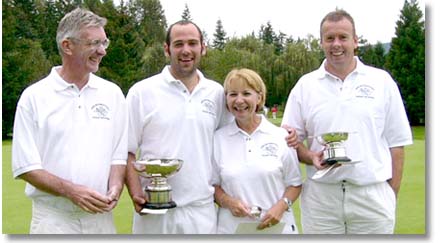
|
| She doesn't claim to be "one of the boys," but she enjoys competing against them. Liz is the shortest of these four giants of croquet. |
BOB: So what they've been telling me - that the state organizations are all designed the same way, with their headquarters facilities and courts built for and supported by the entire region - is actually not true, according to your accounting.
LIZ: No, it's just not true, probably because there's really no compelling reason for it. Each state has it's own idea on this one but generally when a National event is hosted the State administration designates a convenient club involved in play as 'headquarters' for that one event. It has nothing to do with being a 'State HQ'. Dependent entirely on entry, several clubs may be involved in tournament play for the event and one of them will be named HQ for the duration of the event for the purposes of centralization of the event's community meeting and for administrative purposes. In Queensland, for example, we could easily host the MacRobertson Shield. We have one club with five courts, another with four permanent and two additional temporary access lawns and three other clubs, all within very easy reach, with four lawns at each. That would be on the beautiful Sunshine Coast just north of the City of Brisbane (no trekking across major city highways full of metropolitan madness - check out 'Caloundra' and the Sunshine Coast on the web). We could also host the event in the City or on the Gold Coast with a similar arrangement. The Sunshine Coast is within easy access of Brisbane International Airport, has the exact same climate as in Florida, great lawns, friendly clubs full of willing workers, fabulous beaches, close proximity to the Barrier Reef, etc. etc., and has experience of hosting national events in Association, Golf Croquet and Gateball.
BOB: That's great. So why don't you have the MacRobertson there?
LIZ: That's a question the ACA Executive would have to answer for you. I expect it's all about mistakenly believing that everyone needs to play at one single venue. Either that or the Australian Council of States need to learn to better understand their role in the leadership of the Australian Croquet Association; and from my first experience of attending a Council Meeting, I'd say there's a lot they need to learn - and they could start by understanding that it's the Council that instructs the Executive and not the other way round! Great Britain intends to spread the next Mac across several clubs, even traveling from one city to another, so it can't be that critical an issue.
BOB: That's a good place for a transition: Liz, I understand you play Gateball and that you actually LIKE playing Gateball. Is that some kind of heresy?
LIZ: Not at all. In Queensland we have a growing Gateball community, with many of our croquet clubs now renaming themselves as Mallet Sports Clubs playing Association Croquet, Golf Croquet, Gateball and Ricochet. I play all codes of mallet sport, though I'm not very good at Ricochet. It may be that Ricochet is primarily a social code, with competition very much a secondary consideration. I guess I may be too competitive for that one and I'm probably not best suited to Gateball either because the whole team has to follow, unquestioningly, the direction of a Captain who shouts instruction for every shot that's played. I'm sure everyone will know how hard I find that to handle! Gateball doubles is probably more up my street. The National Director of Australian Gateball was living in Queensland, and he came to me and said it would be very useful for some high-profile croquet players to play Gateball, and so I went along to a local city club, they took me under their wing, and I played in their Gateball team in an event held in Rockhampton and had a fabulous time.
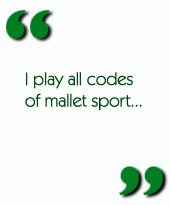
BOB: When was that?
LIZ: That was three years ago. And since that time we've become the biggest state for Gateball. We're hosting the national Gateball competition in October in Rockhampton north of Brisbane in the region we call Central Queensland. You should check that out too on the Internet - the 'Capricorn Coast' area.
BOB: Do you have enough space for the game?
LIZ: Yes, and Gateball can be played competitively on much smaller and rougher lawns so it lends itself easily to say a school or park land environment where there may not be a designated, well manicured lawn facility available.
BOB: The efficiency of Gateball is amazing: Rough lawns, small courts, teams of five...
LIZ: And 30-minute games....
BOB: Here at the National Croquet Center, you could have more than 250 people playing at the same time in the same space occupied by our 12 full-sized croquet courts.
LIZ: It's a little Queensland here in Florida. Queensland is right along side the Great Barrier Reef, it's often very warm, and we're not going to have a lot people wanting to play a two-hour game under the blazing sun in summertime - just like in Florida. So Gateball is a very attractive option. Short games, very social, with people laughing and talking to each other, and moving on an off the lawns very quickly, with time off between games....
BOB: So Gateball is really taking off, now that its escaped the boundaries of Japan and the Asian continent, and I know it's been godfathered by Croquet Australia, your national organization. What's the relationship now and ongoingly between Gateball and Association Croquet in Australia?
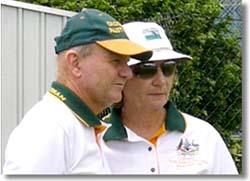
|
| Liz and Bruce Fleming. |
BOB: Is there any effort - any structure - to promote croquet to Gateball players?
LIZ: Yes. There's very little nationally, beside the appointment of a National Director of Gateball [Gilon Smith], but each state has the right to organize Gateball events on their own, and some are more active than others. Crossover from Gateball to croquet or vice versa is, of course, allowed and encouraged. It's all a matter of personal taste and opportunity. Because Gateball can be played almost anywhere, and other codes of croquet need good purpose-built lawns.
BOB: Is there a national structure for ranking and teams and...
LIZ: No, not much of that yet. When there are major events, those teams and structures are currently being put together on an ad hoc basis.
BOB: Surely they have these rankings and such in Japan and China, where Gateball is so huge....
LIZ: No, not that I know of, but I haven't had much dealing with the administration of Gateball other than starting to incorporate some policy structure into our Queensland by-laws and working with my State Gateball Director Bruce McAlister to formalize Gateball's standing within our CAQ organization.
BOB: So Gateball's relationship to croquet in Australia is very much like "backyard croquet's" relationship to USCA croquet. Rough courts, no ranking structure, based on casual, social play....
LIZ: Very much the same at the moment but improving rapidly.
BOB: Let's look at the parallel here. The USCA actually has a "nine-wicket croquet" membership, with not many members, after a couple of years of promotion and slightly promoted and attended national championships. It's a worthy effort, but I have never understood how it could possibly result in significant numbers of new USCA players, because the backyard croquet culture is intrinsically casual, social, occasional - the ethos of the game just doesn't compare to Association croquet on good lawns, just as putt-putt golf doesn't compare with fairway golf.
LIZ: It reminds me of the time when golf croquet was introduced, and croquet players were fearful of golf croquet taking over the courts and spoiling their enjoyment of the sport somehow and of course it didn't happen and it won't happen. I would hate to see one code "taking over" an organization. Instead, you can get the benefit of including, rather than excluding, several codes - and Golf Croquet and Gateball memberships provide that benefit.
BOB: Are people crossing over - that is, beginning with one and "graduating" to another?
LIZ: We have clubs that have Gateball Days. And yes, there are gateballers who see Association Croquet and want to learn to play - not many, but some. And it's perfectly okay for croquet players to take up Gateball - though I haven't seen too much of that, either.
BOB: So there's no hard feeling or hostility between Gateball players and croquet players on the same lawns? For example, I've seen terrible animosity between lawn bowlers and croquet players, and between croquet players and golfers. The territorial imperative is so strong, sometimes, with golfers... (both laughing)
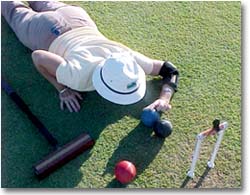
|
BOB: You know, I'm thinking you could entirely avoid territorial disputes just by planting the kind of grass on the non-court areas that could be cut short, if there's sufficient space. Like here, this Bermuda 419 beneath our feet can be cut very short and would be a first-rate Gateball surface, wouldn't it?
LIZ: Yes. And there's another reason that Gateball and the other codes should be encouraged, which is the funding from local government and state government.
BOB: How does that work?
LIZ: Croquet Queensland, our regions, and even our individual clubs all apply and are regularly granted substantial funding from state and regional governments and from gaming funds, etc., because we offer sport and recreational opportunities to a wide cross section of the Queensland comm unity. In order to attract as many 'legs on lawns' as possible we need to offer diversity as well as good, transparent governance.
BOB: There are so many unique elements of sport in Australia that I don't understand and that readers everywhere don't understand, with respect to state involvement in sport in many ways, and one of them I have been fascinated to hear about is something called the "member protection policy." Could you please explain this?
LIZ: I believe the Member Protection Policy has been accepted by all the states and is a national initiative that in my opinion cannot have come a moment too soon.
BOB: So it's a good idea?
LIZ: It's well intended as a grievance policy but it needs to be supported by an educational drive to ensure that members actually know how to use it and what is required in order to reduce the necessity to invoke the policy too often when simpler avenues for resolution could and should be sought as a first option.
BOB: A grievance against a particular organization?
LIZ: A grievance against an organization, group, committee, or individual. One thing I have recently learnt to my cost is that the ACA ought to recognize that they should not be asking players to sign agreements which negate the MPP [Member Protection Policy] - but the least said about that the better! That's probably another one of those opinions I'm not supposed to voice if I know what's good for me!
BOB: You mean the signed confidentiality pledge. It's reminds me of the "loyalty oaths" we had in this country at the height of the Cold War...
LIZ: I had a lot of problems when I first entered into representative teams and eventually after exhausting all avenues in trying to resolve the issues I felt I had no alternative but to go to the Australian Sports Commission in the hope of putting an end to the issues once and for all. That with hindsight probably didn't sit well with some authority figures in Australia. Time has marched on and we now have a Member Protection Policy in Queensland. If you have a problem, I will see to it that you are heard and that your issues are fairly addressed - but I can do that because I'm the president of the Queensland Association and I am committed to making the policy work. I intend to ensure that a full education process continues across Queensland and each region has easy access to a Member Protection Information Officer in order to ensure as full as possible an understanding of the policy and what is required of every member of the association to make it work. It's fine having a policy, but if the general population doesn't understand what the policy is, it's a waste of time.
BOB: You're not saying it doesn't work. You're saying it works partly, and it works sometimes.
LIZ: Any policy is only as good as those administrating it are prepared to allow it to be. It is supposed to protect members - not simply be a tool for administrators to hide behind and wash their hands of responsibility within their organization. A good organization works toward their MPP being a pretty redundant policy because they respond appropriate and correctly to criticism, and their membership is sufficiently educated to respect the rights of every other member under the policy and has faith in the leadership group running the organization correctly and faithfully within their own policy structures. If there is a perception that a MPP is being over used the organization needs to review its operational standards. It's a pressure valve and should be a last resort; if it blows too often there's a problem that needs to be fixed.
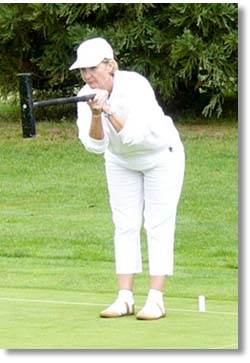
|
| You can hit the mark with a straight swing and straight talk, but sometimes the straight talk backfires. |
LIZ: It was my own free, and well-considered choice to emigrate and for very personal and private reasons. It was a tremendously dark and sad period of loss in my daughter and my life that I needed to distance us both from but yes, with hindsight it was a huge mistake to expect to 'fit in' seamlessly, or easily. It was innocently naive of me, or at least a cultural naivety brought about from my family upbringing. As for the bigotry I have encountered; I do not intend to open that can of worms again. I have heard and tolerated more ignorant rubbish than anyone should have to endure. The stupid witch jokes were just the final ignorant straw. I now know every witch joke known to man and I am no more amused now than I was then.
BOB: So Liz, did you cast a spell or not?
LIZ: No, I did not!
BOB: How generous of you! (both laughing) But there's something I don't understand. The witches were in the Christian culture, weren't they? Are there Jewish witches, too...?
LIZ: Bob, I do not know anything about witches or casting spells! Nor do I wish to know. It just became more and more ridiculous, but it never entirely went away. One stupid person, jealousy, stupidity and an administration too inept to stomp on it when they should have and there you have it, a recipe for the next ten disastrously unhappy years of my representative croquet career mixed with an education that would not allow me to let them get away with it.
BOB: I say it hasn't done you any visible damage. If it has hurt your national career, it hasn't hurt you at all where people know you best, in your home territory.
LIZ: Well, you are very much mistaken there. It most certainly has hurt. It has hurt me very deeply. It has also damaged both my National and State playing career and left a nasty taste in my mouth.
BOB: You're in your second term as Queensland president, and you seem to get good marks from everyone in that role - even the people commenting on your "national" career who say that grudgingly. So let me ask you a sensitive question: An Australian who has been critical of your famous outspokenness, who grudgingly told me, "But she's done a good job in Queensland" also said, "She may be the top woman in the world rankings, but she's not really the best woman player in the world." I know you're clever, Liz, but are you clever enough to choose events by the most meticulous standards that would allow you to manipulate the results?
LIZ: Firstly I want to say that those who make such remarks do not do so with such anonymity as they think, and they ought to be ashamed of themselves. They should know that there are many good men and women who hear what they say and think very little of them for it. They do their cause no good with such nonsense. I probably AM clever enough. Would I be petty enough to do something like that? No, it's just an insult.
BOB: Oh, I'm sorry, Liz, I just thought it was funny, I didn't mean....
LIZ: All you need to do is look at the events I've played. I'm probably the only woman ever to have played in all four major National Open championships in one year - the American, New Zealand, Australian and British Open. I've won State titles, international events, and Australian peer based events, ACA Women's Eight, the ACA 2nd Eight, and I came fourth in the ACA First Eight. I put my ranking on the line time and time again, but I have a life and can't play in every carnival event known to man. I love croquet but there is more to my life than that.
BOB: Are you going to improve your ranking by playing in this World Championship.
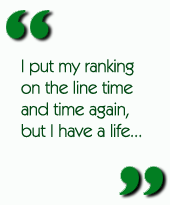
LIZ: I doubt it.
BOB: Why?
LIZ: I think it's a very, very strong field and as many must know I have had my preparation willfully and completely destroyed. But aside from that; there are very few peer based events in Australia and even then many of our highest ranked players do not enter our top events often enough nor do they enter sufficient numbers of events with an international field to give a true indication of how competitive they are in a world-class arena.
BOB: So we're talking about regional "pools" here, where the rankings really DON'T accurately reflect the players' relative abilities?
LIZ: Yes, no matter how often we are told that 'pooling' makes little difference, it's obvious that the ranking of many of our top players in Australia is exaggerated because when we play in international events the rankings simply don't stack up.
BOB: Liz, do you approve of women-only events?
LIZ: I don't DISapprove of them.
BOB: I've heard different. I've heard you have very strong positions about "gender bias." And I frankly don't understand this. I tried to produce a Bay Area Women's' Championship once, because I'd noticed that when we had a top-class event, no women or maybe only one woman showed up. So I thought it would actually be great for women to compete against each other, but that event was boycotted. Only two women would play, and others were outraged that we even announced such an event. Why?
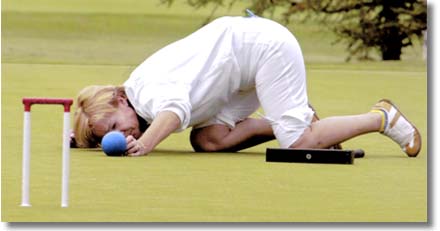
|
LIZ: You didn't intend it, but the result actually is gender bias. We don't need it and I'm obviously not all alone in not wanting it. A few years ago at the World Championships in Cheltenham I was asked by members of the WCF committee what I thought of the WCF introducing a Women's Association World Championship. Surprise, surprise! Yet again, voicing my own valid opinion - which I had been asked to give! - landed me in all sorts of hot water in Australia because the Australian Executive were pushing the idea of a WCF Women's. Yet when the female players who were ranked high enough to be playing at Cheltenham at the time were asked for their opinion, we said, "No, thank you!" I have obviously played in lots of women's events and I've won several women's events - the British Women's Open, the Tasmanian Women's State Championship, the Australian Women's President's Eight; and I've played in state and national teams where the women play the women and the men play the men. I know what I'm talking about, and given the choice my preference is for non-gender bias events in all codes of croquet but if people don't want an honest answer from me, then they should learn not to ask the question. I hope to be invited to play in the WCF Women's Golf Croquet Championship but if you ask me if I think it was a good idea in this day and age to introduce such an event in the first place, my answer would be no! I recognize there were extenuating circumstances which persuaded the WCF to introduce such an event but I believe the best female Golf Croquet players in the World would do very well indeed in a completely open event. The sport gains little or nothing from gender bias in sports where physique is irrelevant. I believe any WCF World Championship should be about the best in the world and not the 'two best' in the world. However, if the majority of international governing bodies vote in favor of gender biased events then, well, I can do no more about it - you win some, you lose some…that's sport for you. If you can't cope with the occasional loss, you shouldn't be playing.
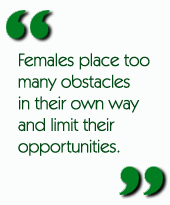
BOB: What about mixed doubles?
LIZ: I believe mixed doubles is the very best way of encouraging and improving the opportunity for female players to improve their playing standards and even the expectations within their own game. Females place too many obstacles in their own way and limit their own expectation and opportunities. Playing with the men raises the expectation and enables players access to support that is rarely offered to females - outside the chosen few who just happen to be closely partnered to a high ranked male player...(me included).
BOB: Okay. Very clear. I've really enjoyed the interview. I've known you and Bruce for many years for your both playing in Northern California at the Sonoma-Cutrer Worlds, and you're one of only three women in this World Championship. You, and Carol Jackson from South Africa, and Debbie Cornelius. If you come up against each other somewhere, I'd like to watch the game.
LIZ: Whatever for?
BOB: Well, just because I'm a journalist, and it would be...
LIZ: I don't like to play against other woman, ever.
BOB: Is it a problem?
LIZ: It IS a problem, yes. It's an individual thing, but I don't think women treat each other very well.
BOB: Are you talking about female psychology?
 LIZ: Oh dear, we really shouldn't go there!
(both laughing)
Don't you think it would be great to see me play against Dave Maugham, Reg, Rich Lamm or Bob Cherry? Jenny Clarke and I have played both with and against each other. We were quite successful as a doubles combination but it wasn't earth shatteringly entertaining and I don't think either of us particularly needs or wants to repeat the experience. In fact we both have exceptionally good doubles partners in our husbands. (Bruce and I are the only Australians to have won the New Zealand Open Doubles Championship.) We have both won and lost games against each other. Just because we happen to be female doesn't necessarily mean we are going to be more or less entertaining, best friends, or even should particularly seek one another's company during a sporting event. Both of us simply expect to be treated exactly the same as any other player in any competition we enter. We are both intelligent individuals, excellent croquet players who happen to be female - it's irrelevant, we simply excel in the particular code of croquet we have both chosen and are not intimidated by the boys....or the girls.
LIZ: Oh dear, we really shouldn't go there!
(both laughing)
Don't you think it would be great to see me play against Dave Maugham, Reg, Rich Lamm or Bob Cherry? Jenny Clarke and I have played both with and against each other. We were quite successful as a doubles combination but it wasn't earth shatteringly entertaining and I don't think either of us particularly needs or wants to repeat the experience. In fact we both have exceptionally good doubles partners in our husbands. (Bruce and I are the only Australians to have won the New Zealand Open Doubles Championship.) We have both won and lost games against each other. Just because we happen to be female doesn't necessarily mean we are going to be more or less entertaining, best friends, or even should particularly seek one another's company during a sporting event. Both of us simply expect to be treated exactly the same as any other player in any competition we enter. We are both intelligent individuals, excellent croquet players who happen to be female - it's irrelevant, we simply excel in the particular code of croquet we have both chosen and are not intimidated by the boys....or the girls.
What is interesting is that Jenny and I have similar educational backgrounds and expectations in life, which is mostly likely the best indicator of how and why we have achieved the standard of play we demonstrate and of what drives us to want to compete at the level we've chosen.
BOB: Okay, well, do you have a suggestion for an ending to this delightful interview, Liz? A snappy quote, a wise saying?
LIZ: Or just a jump off the cliff? How about, "Stupidity prevails when good men and women fail to act." Or, "Try living life every day with the three E's: energy, enthusiasm and empathy."
BOB: Pretty good closers! Let's watch some croquet now.
Elizabeth Fleming lives with her husband Bruce Fleming in a leafy suburb on the south side of the Brisbane River in Queensland, Australia. She learned to play croquet in her early thirties and has risen to be one of the world's highest ranked females. She and Bruce have produced eight children between them, and not one of their offspring plays croquet. Liz, now retired from her profession as a Neurologist and Clinical Psychologist, currently holds the office of President of the Croquet Association in Queensland. Recipient of a Commonwealth of Australia Sport Achievement Award and winner of events in three of the big four croquet playing countries - Australian President's Eight, British Ladies Open Championship, New Zealand Open Doubles - and many singles and doubles events across Australia, she has yet to achieve two croquet goals: playing on a team for her native Lancashire, and winning an event somewhere in America.